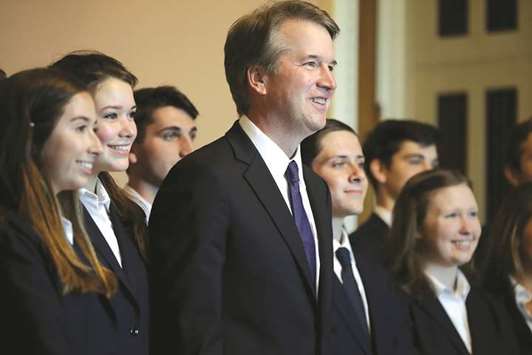President Donald Trump’s Supreme Court nominee may not have to wait too long for controversial cases if he is confirmed to the job, with disputes involving abortion, immigration and voting rights possibly heading toward the justices soon.
Republicans are hoping Brett Kavanaugh, the conservative US appeals court judge selected on Monday by Trump to replace retiring Justice Anthony Kennedy, will be confirmed by the Senate before the next Supreme Court term opens in October.
There are no blockbusters among the 38 cases already on the docket for the justices, but they could add disputes on controversial issues being appealed from lower courts.
Legal battles are developing over state laws restricting abortion including one in Arkansas that effectively bans medication-induced abortions. The justices in May opted not to intervene in a case challenging that law, waiting instead for lower courts to rule, but it could return to them in the future.
Other abortion-related cases could reach the court within two years. These involve laws banning abortions at early stages of pregnancies, including Iowa’s prohibition after a fetal heartbeat is detected.
There is litigation arising from plans by certain states including Louisiana and Kansas to stop reimbursements under the Medicaid insurance program for the poor for Planned Parenthood, a national abortion provider.
There also are challenges to state laws imposing difficult-to-meet regulations on abortion providers such as having formal ties, called admitting privileges, at a local hospital.
Kavanaugh’s judicial record on abortion is thin, although last year he was on a panel of judges that issued an order preventing a 17-year-old illegal immigrant detained in Texas by US authorities from immediately obtaining an abortion.
On immigration, litigation is continuing over Trump’s plan to rescind a program created under Democratic former president Barack Obama that protected from deportation hundreds of thousands of young immigrants brought to the United States illegally as children. Lower courts blocked Trump’s plan to scrap the program.
Congress has failed to agree on a plan to replace it.
Kavanaugh could have to deal with cases involving a practice called partisan gerrymandering in which state legislators redraw electoral maps to try to cement their own party in power.
In June, the justices avoided a broad ruling on whether partisan gerrymandering violates the constitutional rights of voters and whether federal judges can intervene to rectify it.
Democrats have said Republican gerrymandering has helped Trump’s party keep control of the US House of Representatives and various state legislatures.
Kennedy previously kept his conservative colleagues from closing the door to litigation in federal court challenging partisan gerrymandering.
The partisan gerrymandering case most likely to return to the Supreme Court involves claims that Republican legislators in North Carolina manipulated the boundaries of the state’s 13 US House districts to ensure lopsided wins for the party.
Attorney Paul Smith of the Campaign Legal Center, which represents the North Carolina plaintiffs, said they had been focused on trying to convince Kennedy to rule in their favour, and now will try to convince Chief Justice John Roberts, seen as the next-most-moderate of the conservative justices.
Smith viewed Kavanaugh as likely voting with the court’s most conservative justices to reject gerrymandering challenges.

Judge Brett Kavanaugh stands with members of the Senate Page programme at the US Capitol yesterday.
